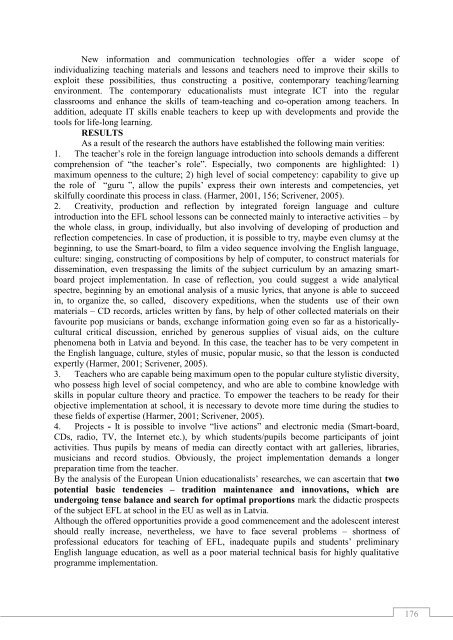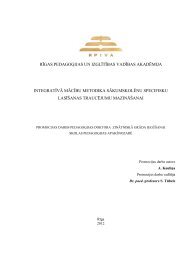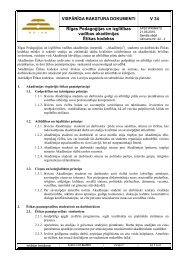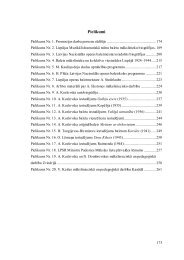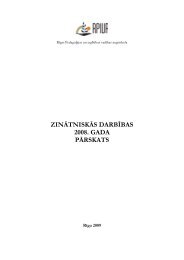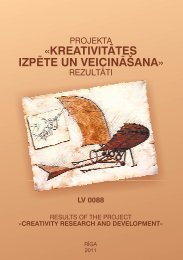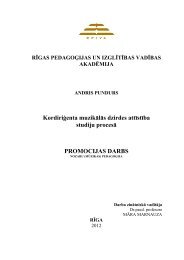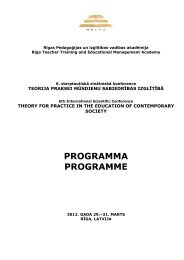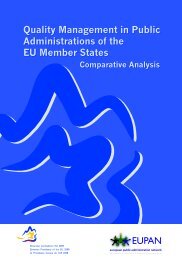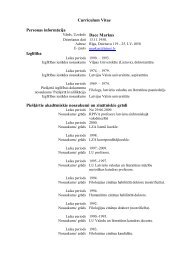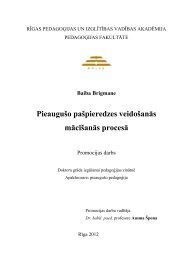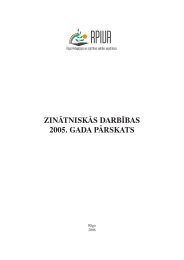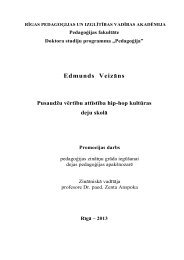New information and communication technologies offer a wider scope ofindividualizing teaching materials and lessons and teachers need to improve their skills toexploit these possibilities, thus constructing a positive, contemporary teaching/learningenvironment. The contemporary educationalists must integrate ICT into the regularclassrooms and enhance the skills of team-teaching and co-operation among teachers. Inaddition, adequate IT skills enable teachers to keep up with developments and provide thetools for life-long learning.RESULTSAs a result of the research the authors have established the following main verities:1. The teacher‘s role in the foreign language introduction into schools demands a differentcomprehension of ―the teacher‘s role‖. Especially, two components are highlighted: 1)maximum openness to the culture; 2) high level of social competency: capability to give upthe role of ―guru ‖, allow the pupils‘ express their own interests and competencies, yetskilfully coordinate this process in class. (Harmer, 2001, 156; Scrivener, 2005).2. Creativity, production and reflection by integrated foreign language and cultureintroduction into the EFL school lessons can be connected mainly to interactive activities – bythe whole class, in group, individually, but also involving of developing of production andreflection competencies. In case of production, it is possible to try, maybe even clumsy at thebeginning, to use the Smart-board, to film a video sequence involving the English language,culture: singing, constructing of compositions by help of computer, to construct materials fordissemination, even trespassing the limits of the subject curriculum by an amazing smartboardproject implementation. In case of reflection, you could suggest a wide analyticalspectre, beginning by an emotional analysis of a music lyrics, that anyone is able to succeedin, to organize the, so called, discovery expeditions, when the students use of their ownmaterials – CD records, articles written by fans, by help of other collected materials on theirfavourite pop musicians or bands, exchange information going even so far as a historicallyculturalcritical discussion, enriched by generous supplies of visual aids, on the culturephenomena both in Latvia and beyond. In this case, the teacher has to be very competent inthe English language, culture, styles of music, popular music, so that the lesson is conductedexpertly (Harmer, 2001; Scrivener, 2005).3. Teachers who are capable being maximum open to the popular culture stylistic diversity,who possess high level of social competency, and who are able to combine knowledge withskills in popular culture theory and practice. To empower the teachers to be ready for theirobjective implementation at school, it is necessary to devote more time during the studies tothese fields of expertise (Harmer, 2001; Scrivener, 2005).4. Projects - It is possible to involve ―live actions‖ and electronic media (Smart-board,CDs, radio, TV, the Internet etc.), by which students/pupils become participants of jointactivities. Thus pupils by means of media can directly contact with art galleries, libraries,musicians and record studios. Obviously, the project implementation demands a longerpreparation time from the teacher.By the analysis of the European Union educationalists‘ researches, we can ascertain that twopotential basic tendencies – tradition maintenance and innovations, which areundergoing tense balance and search for optimal proportions mark the didactic prospectsof the subject EFL at school in the EU as well as in Latvia.Although the offered opportunities provide a good commencement and the adolescent interestshould really increase, nevertheless, we have to face several problems – shortness ofprofessional educators for teaching of EFL, inadequate pupils and students‘ preliminaryEnglish language education, as well as a poor material technical basis for highly qualitativeprogramme implementation.176
During the study, experiences in teaching, teacher training and learning of EFL in theEuropean Union member countries and beyond were analyzed by the educationalists,pursuing the final goal to sum up new information on the diverse significance of English,creativity and culture for the life of the contemporary pupils of the grades 3–9 and theirteachers.By the research results, after analysis of EFL pedagogy and didactics‘ literature in Latvia andin the EU, it was possible to learn about the main tendencies of perfection for the contents ofthe subject EFL at school – traditions and innovations, as well as discussions on thefavourable balance between them. In comparison with the situation in Latvia, where thecontents of the subject EFL is still based only on the classical traditions and the main accent isattached to the development of speaking and writing skills, a lot of pupils lose their interest inEFL, because education contents do not fulfil their interests. By pedagogical experiments thefollowing was established: the teachers allocate inadequate time amount to involvingcreativity activities, role-plays, lyrics of songs and current topics crucially significant for eachof the learners into EFL acquisition, each of the abovementioned tasks can involve asmartboard use as well.Of course, it does not mean that at once EFL lesson agenda has to be totallytransformed according to the students‘ interests; still the students‘ interests should not berejected and denied completely. ‗We need to show our students that each culture, eachcivilization and country is different and unique, and that this is what makes the human race sobeautiful‘ (Loras, 2007, 22) and able to evolution.So Latvian culture traditions should be taken into consideration and some balanceshould be searched for between the traditions and innovations, thus ensuring the continuityand development of teaching traditions, as well as suggesting the pupils to acquire thediversity of the English language by the media of culture, such as songs and chants includingpop, rock, jazz music. Thus students feel surrounded by positive attitude complemented bythe benevolent learning environment, stimulating motivation increase to learn languages. Itcould not be achieved without teacher development, which is ‗the process of becoming thebest kind of teacher that I can personally be. Teacher development draws on the teacher‘s owninner resource for change…it is a self-reflective process‘ as claim Head, K. and Taylor, P. inReadings in Teacher Development. (Head, Taylor, 1997, 143)The study widespreads the results of the CulTiFoLa, MultiFoLa projects and will followclosely the developments of CreaTiFoLa project, yet it also elaborates on them consideringthe peculiarities in Latvia. It appreciates the incorporated outcome of these projects into CLILeducation, CLIL lessons and CLIL teaching materials via keeping the files of previousprojects in the archives of the same IT tool, Moodle shared with educationalists of Latvia. Itappeals to students and staff to continue working together in order to discuss the changingeducation paradigm and to produce material for intercultural dialogue in the classroom.This study fosters tolerance, student centredness, diminishes the gap between theperformances of learners‘ from different cultural background, exploits students‘ existingknowledge and experience, fosters plurilingualism, increases the communicative competenceof the students and helps to develop plurilingual interests and attitudes.If people become bilingual and most probably later multi-lingual, their competitiveness at theLabor market will increase. Correlation of the abovementioned components will serve as thebeginning of continued life-long learning and positively, optimistically oriented peoplesuccessfully flourishing in the democratic society of the EU.CONCLUSIONSTo ensure the change in the contents of the subject EFL in accordance with the contemporarystudents/pupils‘ interests, we suggest the following recommendations:177
- Page 6 and 7:
1. attēls. Deju kolektīva koncert
- Page 8 and 9:
4. attēls. Pieredzes veidošanās
- Page 10 and 11:
6. attēls. Deju kolektīva koncert
- Page 12 and 13:
veidošanai un attīstīšanai prak
- Page 14 and 15:
DARBA MĒRĶISTeorētiski un prakti
- Page 16 and 17:
ealitāti. Saziľas situācijas izs
- Page 18 and 19:
Kritēriji, pēc kuriem ir noteikta
- Page 20 and 21:
3. attēls. Situāciju analīze jau
- Page 22 and 23:
LIĀNA BIEZBĀRDERīgas Pedagoģija
- Page 24 and 25:
vajadzībām un interesēm un ļaut
- Page 26 and 27:
Jau J. A. Komenskis „Lielajā did
- Page 28 and 29:
mācību literatūras un metoţu iz
- Page 30 and 31:
7. VĒRES1. Beļickis, I. (2001) Iz
- Page 32 and 33:
arhīva darbs.Sekretārei/am tiek i
- Page 34 and 35:
attiecināmi uz stāvokli Latvijā.
- Page 36 and 37:
Nozīmības pakāpevadības tiesisk
- Page 38 and 39:
ētikas un estētikas pamati; lietv
- Page 40 and 41:
darba intensitātes rādītājus. P
- Page 42 and 43:
2. tabula. RSI Guard uzskaites rezu
- Page 44 and 45:
1. attēls. Triju respondentu darba
- Page 46 and 47:
6. tabula. Triju respondentu RSI Gu
- Page 48 and 49:
Otrajam respondentam: vienveidīga,
- Page 50 and 51:
Apkopojot rezultātus, var secināt
- Page 52 and 53:
11. tabula. Rotētā faktoru svaru
- Page 54 and 55:
VĒRES1. A Detailed Analysis of Rsi
- Page 56 and 57:
indivīdam un katrai cilvēku grupa
- Page 58 and 59:
vadoľiem, senioru koru repertuāra
- Page 60 and 61:
3) izpratne par to, ka dziedāšana
- Page 62 and 63:
The phrase 'Rescue attempts are bei
- Page 64 and 65:
RESULTSObservation sheet for the 12
- Page 66 and 67:
What kind of activities do you enjo
- Page 68 and 69:
Language learners need to be collec
- Page 70 and 71:
ealizēties viľa radošajām poten
- Page 72 and 73:
REZULTĀTSGadiem ritot skolēni gū
- Page 74 and 75:
Skolotājs vada skolēna darbību v
- Page 76 and 77:
Aplūkojot grāmatu plauktus grāma
- Page 78 and 79:
ērniem. Ja vecāki neatļauj sev p
- Page 80 and 81:
INGUNA KALVIŠARīgas Pedagoģijas
- Page 82 and 83:
veltītu Brāmsam un Šūmanim mūz
- Page 84 and 85:
vadīt skolēnu kori Oldenburgā. K
- Page 86 and 87:
Skolas apmācības procesā spēja
- Page 88 and 89:
apstrādājot skaľas un simbolus.
- Page 90 and 91:
2. Rakstītā teksta uztverei un vi
- Page 92 and 93:
DARBA MĒRĶISIzzināt Raimonda Pau
- Page 94 and 95:
P. Pečerskis atzīmē, ka tā ir a
- Page 96 and 97:
MADARA KIRŠFELDERīgas Pedagoģija
- Page 98 and 99:
prognozējošajai funkcijai, kur no
- Page 100 and 101:
Stratēģiskais mērķis ir īss un
- Page 102 and 103:
Lai izstrādātu vērtēšanas krit
- Page 104 and 105:
ZIGRĪDA KRĪGERERīgas Pedagoģija
- Page 106 and 107:
spēcīga diafragma - mūsu lielāk
- Page 108 and 109:
augstumu skaľu rindā, tad vokāl
- Page 110 and 111:
kuru balsis sākumā šķitušas ne
- Page 112 and 113:
DAIGA KRONBERGARīgas Pedagoģijas
- Page 114 and 115:
ievērotu, jo veidojot savstarpēj
- Page 116 and 117:
savstarpējo attiecību normas, kā
- Page 118 and 119:
SECINĀJUMI1. Lietišķā etiķete
- Page 120 and 121:
„Uzņēmējdarbības izpratne. Sp
- Page 122 and 123:
zinātne par saimniecību, par to,
- Page 124 and 125:
Inovācijas gala rezultāts ir jaun
- Page 126 and 127: Tikai uzľēmējdarbības sektorā
- Page 128 and 129: SECINĀJUMI1. Globālās krīzes ie
- Page 130 and 131: vienu elementu, kas nedaudz pietuvi
- Page 132 and 133: Visbieţāk (33%-36%) respondenti s
- Page 134 and 135: Valsts policiju, bieţāk norādīj
- Page 136 and 137: Kā arī nepieciešams izveidot pol
- Page 138 and 139: Lai risinātu šo skolotājiem šķ
- Page 140 and 141: Ja skolotājs, izvirzot problēmu,
- Page 142 and 143: kā arī nav skaidrība par skolēn
- Page 144 and 145: 4. attēls25%DažreizVienmēr75%Tas
- Page 146 and 147: VĒRES1. Fišers, R. (2005) Mācīs
- Page 148 and 149: Zīmolu aizsargā kā uzľēmuma in
- Page 150 and 151: Adidas kontrolē nonāca aptuveni 2
- Page 152 and 153: Uzľēmums nodarbojas ar labāko, k
- Page 154 and 155: Viens no mārketinga komunikāciju
- Page 156 and 157: Vērtējot zīmolus pēc tā, kurš
- Page 158 and 159: PROBLEMS WHICH PUPILS FACE IN SCHOO
- Page 160 and 161: class). Learning quality and speed
- Page 162 and 163: individuality and affect it appropr
- Page 164 and 165: Intelekts tiek skaidrots kā intele
- Page 166 and 167: mērķtiecīga audzināšana. Tāp
- Page 168 and 169: 5. Stāstījuma veidošana, sacerē
- Page 170 and 171: INTA RATNIECERiga Teacher Training
- Page 172 and 173: to the needs of each party involved
- Page 174 and 175: materials on a DVD, a collection of
- Page 178 and 179: 1. To stimulate contemporary Englis
- Page 180 and 181: LENA SCHRAMMTechnische Universität
- Page 182 and 183: material is only available in one c
- Page 184 and 185: Adding one more question from the i
- Page 186 and 187: INA STRAUTNIECERīgas Pedagoģijas
- Page 188 and 189: līdzīgas un ir saistītas ar cilv
- Page 190 and 191: SamaksaPaaugstinājumsamatāDarba v
- Page 192 and 193: Arī SIA ―Inna Projekts‖ darbin
- Page 194 and 195: VĒRES1. Blumberga, S., Grundmane,
- Page 196 and 197: vieglam ceļam mācībās, bet izsl
- Page 198 and 199: pārējās valodas tiek izslēgtas
- Page 200 and 201: LIGITA TURLAJAValsts robeţsardzes
- Page 202 and 203: 1.attēls. Respondentu vecuma grupa
- Page 204 and 205: tālu no savas sociālās vides;jā
- Page 206 and 207: AIJA URBĀNERīgas Pedagoģijas un
- Page 208 and 209: Tikai pēc tam seko citi līdzekļi
- Page 210 and 211: līdzi, izpildīt daţas darbības,
- Page 212 and 213: 6. Cik bieţi Jūs izmantojat pirst
- Page 214 and 215: VĒRES1. Boša, R. (1999) Bērnu ru
- Page 216 and 217: Vienotas elektroniskas formas, darb
- Page 218 and 219: 4. attēls. Neprofesionāli noform
- Page 220 and 221: REZULTĀTIVEIDLAPU IZVEIDE PROGRAMM
- Page 222 and 223: DAGNIJA VIGULERīgas Pedagoģijas u
- Page 224 and 225: īsu brīdi, pieaugušo vadībā un
- Page 226 and 227:
Pirmsskolas vecuma bērna personīb
- Page 228 and 229:
informāciju, kas pauţ saprotamu e
- Page 230 and 231:
1. attēls. B. S. Blūma taksonomij
- Page 232 and 233:
Kursa apguve nodrošina dejotāja s
- Page 234 and 235:
Apstiprinošas atbildes par emocion
- Page 236 and 237:
SINTIJA ZAĻKALNERīgas Pedagoģija
- Page 238 and 239:
vēlme ko mainīt dzīvēneapmierin
- Page 240 and 241:
1. zīmējums. VP darbinieku amatal
- Page 242 and 243:
ierindniekikaprāļiseržantivirsse
- Page 244 and 245:
vidējāvidējā speciālā1.līme


